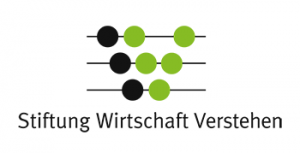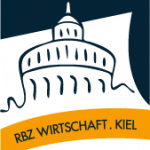YES! 2022
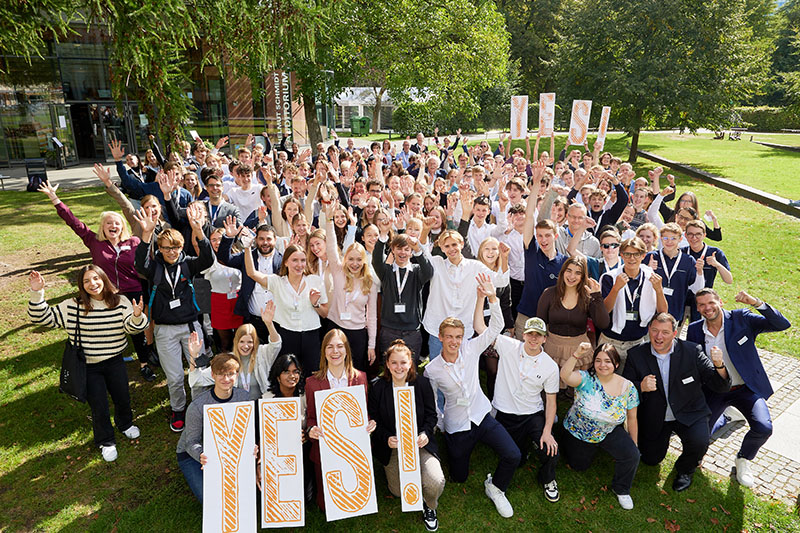
The teams of the YES! Finals 2022. Photo: YES! – Young Economic Summit
For the first time after two digital years, roughly 130 students from three countries came together in Hamburg to present and discuss their ideas on current issues – that was an opportunity we have all been longing for.
The YES! 2022 Final took place from 19-21 September. After 18 rounds of presentations, discussions with experts and among the students, all teams voted and selected their winners on Wednesday afternoon.
Picture this: A group of about ten teenagers are standing together. All with backpacks and suitcases at their feet, jackets already put on. A few boys from the UK are putting their school-uniform ties and jackets on the German students. They are laughing and posing for pictures together. Two teachers are watching the scene from a few metres to the side: „They just don’t want to leave.“
These were just some of the new friendships formed over a three-day event. Most of their conversations started because of the topics the school teams had been working on for the last few months. Every team presented research, ideas and solutions that kicked off intense discussions. After fifteen minutes with our invited experts, all students in the auditorium posed their questions for the next ten minutes. However, these time slots never seemed to be enough. The discussions continued during every break and bit of free time when the teams sought each other out.
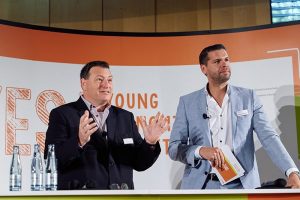
Moderators David Patrician (left) und Alexander Müschen (right). Photo: YES! – Young Economic Summit
The scene had looked slightly different on Monday morning. 130 students and their teachers arrived at the Bucerius Law School in Hamburg. They had travelled from all over Germany, from the UK and US. There was a mix of tension and excitement in the air as everyone settled in. Our two hosts, Alexander Müschen and David Patrician, quickly made the auditorium feel like home. They managed to make even the slightly jet-lagged participants in the room feeling energised and ready.
First came a short round of interviews with representatives of the co-organisers of the YES!. Dr. Nina Lemmens, member of the executive board of the Joachim Herz Foundation and Prof. Dr. Marianne Saam, Head of Knowledge Transfer Economics at the ZBW – Leibniz Information Centre for Economics. They congratulated the finalists and posed two challenges:
Dr. Lemmens gave insight into the foundation’s key motivation for supporting the YES!: Furthering economic education. She hopes that the insights the teams had gained into science and research would further their curiosity, appetite for education and enable them to fulfil their dreams. Her challenge: “Use what you have learned and keep it going by exploring science-based occupations or starting your own companies.”
Prof. Dr. Saam emphasised the students’ unique perspective due to the fact that they weren’t yet confined to the bureaucratic challenges of work-life. It is her hope that through the YES! the machine room of research was opened up for the teams. She encouraged the young people to pursue economic and social sciences and challenged especially the girls in the room: “I hope to see one or more of you a professor of economics one day!”
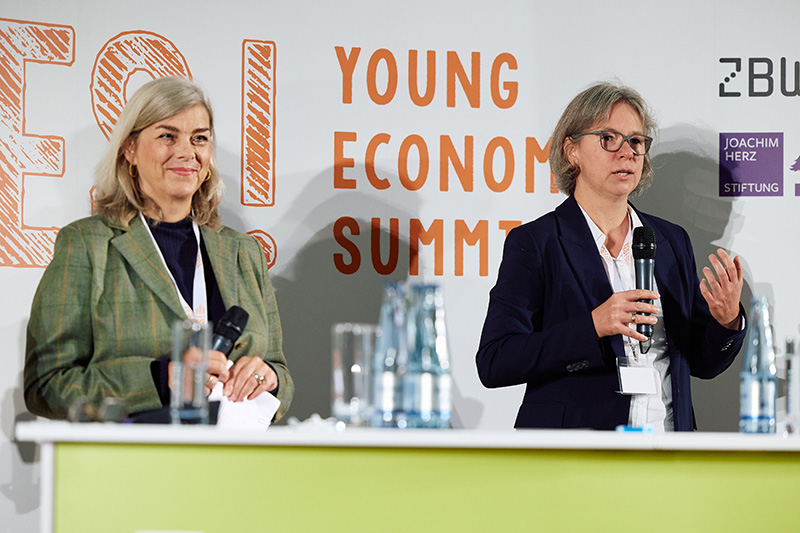
Dr. Nina Lemmens (left) und Prof. Dr. Marianne Saam (right). Photo: YES! – Young Economic Summit
Afterwards, the challenges became much more immediate: Our 18 presentations began. You could tell that these young people had come prepared. They were now experts on the topics they had been researching for the past months. No matter how nervous, they held assured, impassioned and inspiring talks. They confidently discussed their proposed solutions’ potential and shortcomings with decision-makers, experts, and the other students.
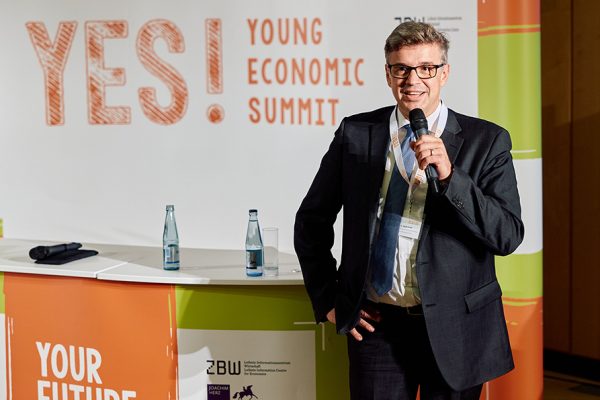
Dr. Stefan Profit from the Federal Ministry for Economic Affairs and Climate Action. Photo: YES! – Young Economic Summit
On Tuesday, the teams received a boost of motivation from Dr. Stefan Profit. He is the Deputy Director-General of the Economic Policy Department within the German Federal Ministry of Economic Affairs and Climate Action, under whose patronage the YES! stands: “The Ministry has supported YES! for years, and it’s one of the best investments we’ve made. You, students, have been digging into topics with your researchers and teachers. This experience and collaboration will be worth more than you may think. My thanks go to you students at the heart of the YES! and to your teachers, the researchers and organisers.”
The collaboration among school teams and their supporting researchers was evident during the whole event. The teams gave shout-outs to their mentors and enjoyed the opportunity to meet some of them in person and even explore Hamburg together in the evenings. One such occasion was a boat tour through the port of Hamburg. The salty breeze was a great refreshment after the intense hours spent listening, discussing, presenting and making new friends.
Alas, every great thing must come to an end: After 18 one-minute pitches to remind everybody of all the presentations, the students voted. They applied the criteria that had shaped their own YES! projects: The clear identifications of a problem, the scientific approach to a solution and the innovation, feasibility and effect of said solution.
While the students’ votes were counted, our scientific jury rewarded the Best Scientific Analysis Award. This award is given to the team standing out because of the quality of their scientific research and an evidence-backed solution. This year’s recipient of the award is the St. Raphael Gymnasium from Heidelberg with their idea Bring the public back into public procurement
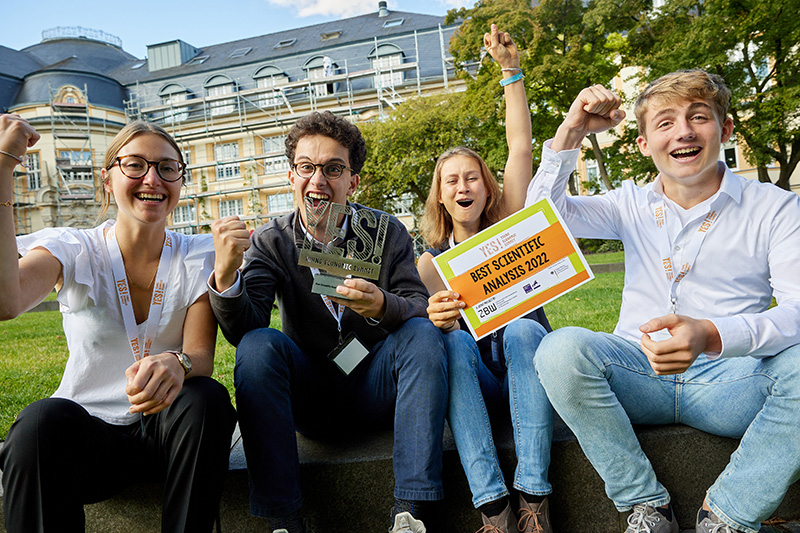
Team from St. Raphael Gymnasium Heidelberg
Among our five international teams, the students voted for the initiative Migration Education for the Misinformed Nation from Sheffield Girls’ Sixth Form. This international collaboration within our YES! BRIDGE project was made possible with help from the German Federal Ministry of Education and Science and the Royal Economic Society of the UK.
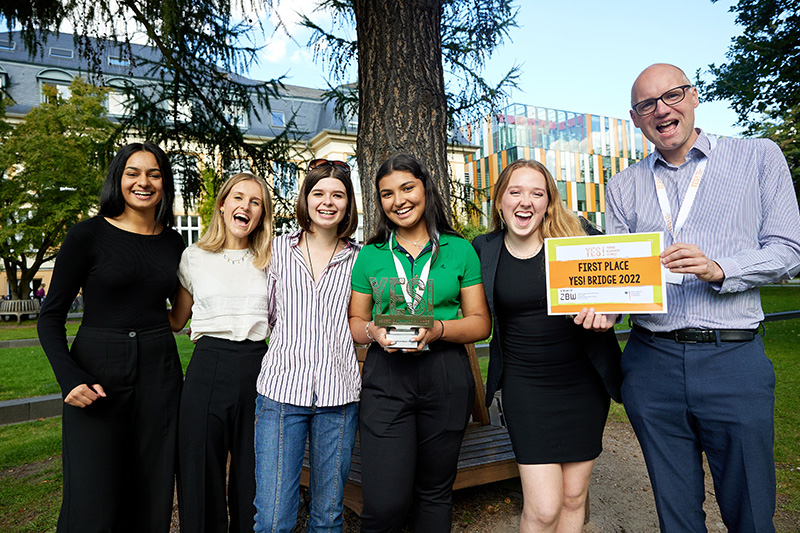
Team from Sheffield Girls’ Sixth Form
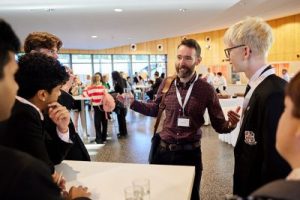
Sam mcLoughlin talking to students
Sam McLoughlin, campaign manager for Discover Economics within the Royal Economic Society joined us in Hamburg and called the YES! a “truly life-changing experience for all involved”. He went on: “It was so inspiring to see young people from a variety of backgrounds come together to tackle the real economic problems in today’s society. Not only does this give young people an opportunity to voice their opinions and share unique solutions, but it provides a platform for them all to have exciting futures. It was a pleasure to coordinate the UK activity on behalf of Discover Economics – The Royal Economic Society and to work with the great YES! Team.”
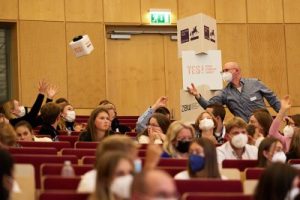
Jochen Bast passing the microphone to a student
“Spending three days together at the YES! Final transformed a group of 18 different school teams from Germany, the UK and the USA into one large group of students who treated each other with great respect for their work,” added Jochen Bast, project manager at the YES! team and co-coordinator of the YES! Bridge project. “And yet, they all learned how different problems and solutions can look in various countries. One question kept popping up: “How can your solution work in my country?” That’s how inspiration works!”
Third place among the German teams went to the Gymnasium Buckhorn Hamburg with their idea UseH2 for more sustainable air travel.
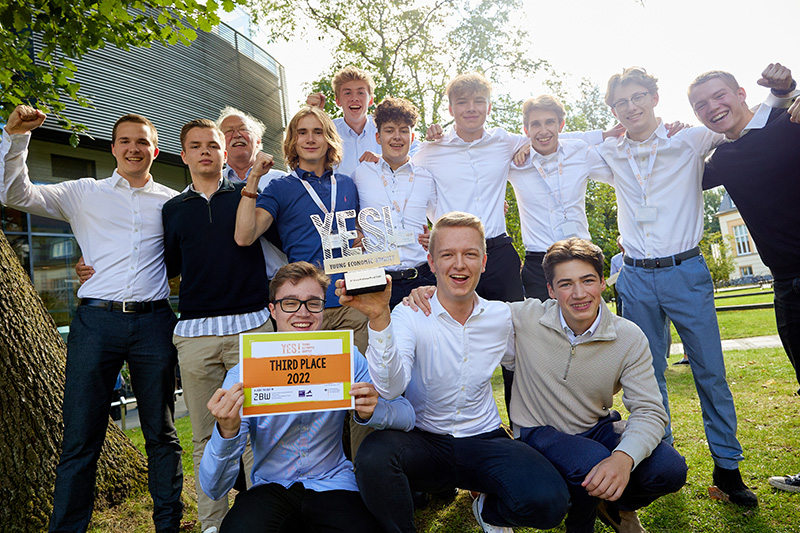
Team from Gymnasium Buckhorn Hamburg
In second place: GreenChoice – a proposal for lowering the CO2 footprint of meals in canteens by the Gymnasium der Schulstiftung Seligenthal.
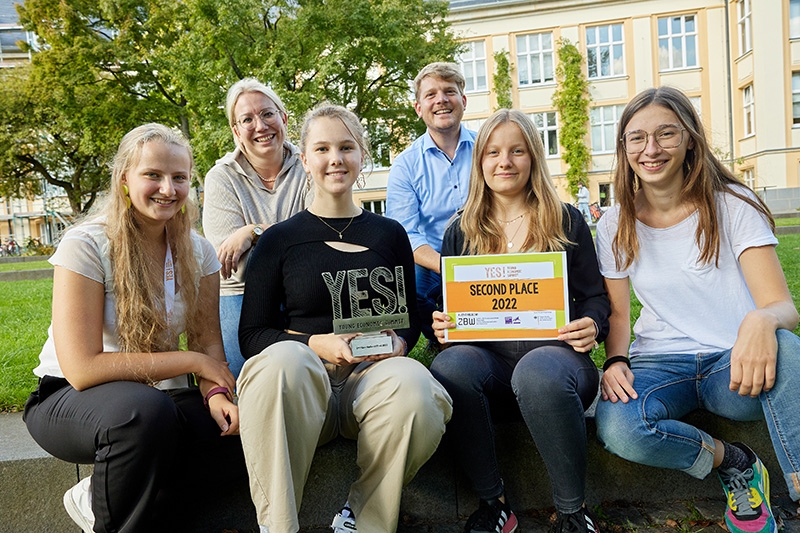
Team from Gymnasium der Schulstiftung Seligenthal Landshut
The first place of the YES! 2022 was awarded to the Gymnasium Martineum Halberstadt and their idea: INSIGHT – Transparency. Privacy. Insight. Developed as an answer to the topic “If it costs nothing, you are the product – how does that change us and how can we change that?” which was posed by Maximilian Müller from the ESMT Berlin.
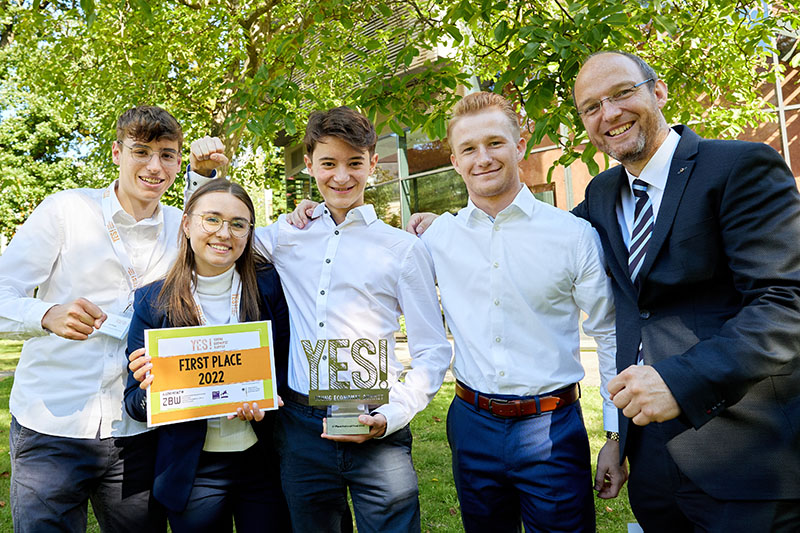
Team from Gymnasium Martineum Halberstadt
Of course, in the end, there were excited and overwhelmed winners and a few tears of joy as well as a few teas of disappointment, which only spoke to the great dedication the young people had approached this competition with.
After drying all kinds of tears, everyone came together for a final reception and celebrated what they all had achieved. The goodbyes lasted for a long time, as students, teachers, researchers and experts had all had intense and unique conversations and experiences that nobody really wanted to let go of.
As the YES!-Team behind this event, we were simply delighted with the knowledge, passion, dedication and fun that all participants brought to the YES! 2022. We look forward to celebrating the winning teams once more at our awards ceremony in Berlin this December.
Your YES! team
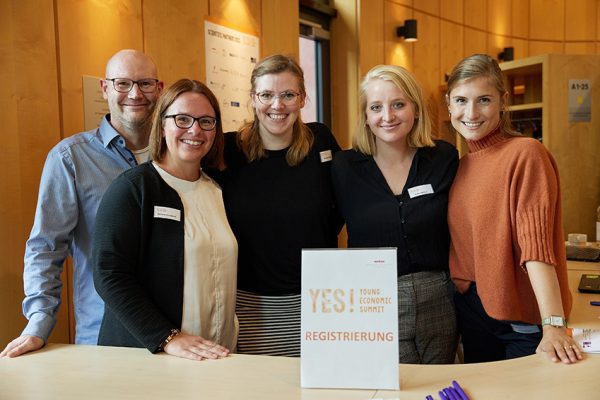
Jochen Bast, Stefanie Krambeck, Andrea Schmidt, Bente Rathjen and Svea Kreutz from the YES!-Team (left to right)
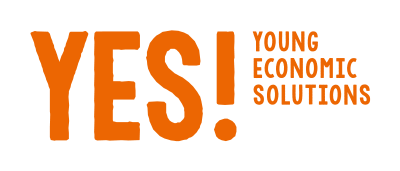



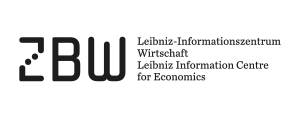
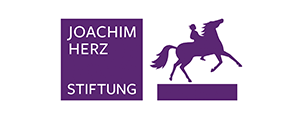
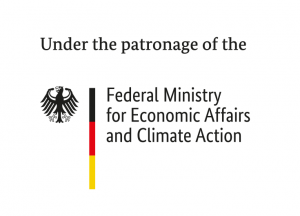 The YES!-Young Economic Summit has been under the patronage of the German Federal Ministry of Economic Affairs and Climate Action since 2015.
The YES!-Young Economic Summit has been under the patronage of the German Federal Ministry of Economic Affairs and Climate Action since 2015.

